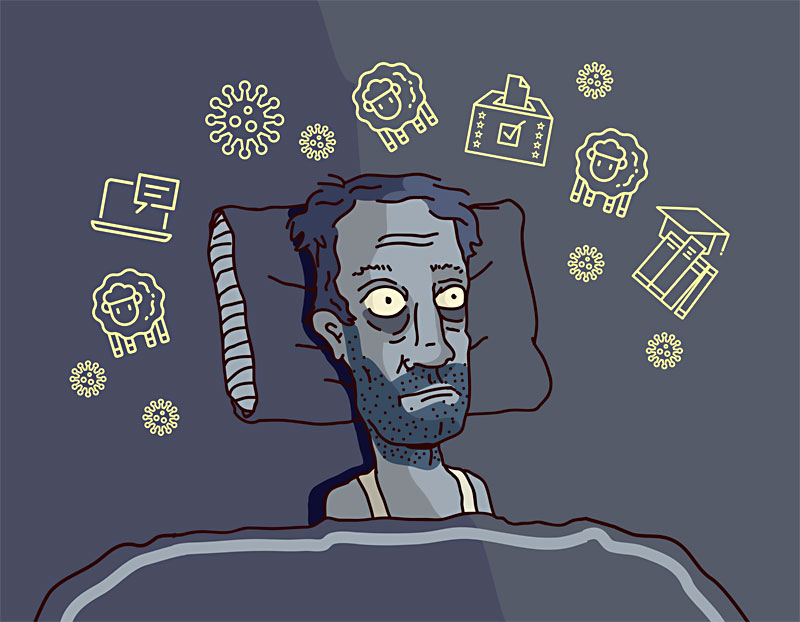
Standing in front of my bathroom mirror after another night of never falling asleep, I prayed to the Zoom gods that my laptop camera resolution be just shitty enough that my Chronpatriots couldn't distinguish my under-eye circles from my blossoming under-under-eye circles.
I'd become a card-carrying, chronically cranky member of the insomniac club – and I had the Google search history to prove it: "How much is too much melatonin," "how long can you go without sleep," or the frustratingly fruitless, "how to fall asleep."
But it wasn't until a citywide drugstore pillage for more melatonin gummies where I'd come across one shelf after another cleaned out of sleep aids that I figured I might be in good, if bleary-eyed, company. Is anybody actually sleeping right now? How can anybody sleep right now?
In a poll on COVID's impact on mental wellbeing by the American Psychiatric Association, more than one-third of Americans say coronavirus is having a severe impact on their mental health, with 19% of respondents reporting having trouble sleeping. Though that 19% might not illustrate a significant impact, there's emerging anecdotal evidence that more people are experiencing insomnia from pandemic-specific stressors. In fact, physicians have even coined this COVID-induced insomnia: "coronasomnia."
People can experience insomnia for lots of reasons. But in relation to stress, Dr. Sasha Jaquez, a paediatric psychologist in UT Health Austin Paediatric Psychiatry at Dell Children's Medical Centre, points to what happens to our bodies when we experience stress. "Our body is in fight-or-flight mode, and it's that survival mode – like you have to be alert, you have to keep going – that's what stress causes," explains Jaquez, who established a behavioural sleep medicine clinic at Akron Children's Hospital before her current role at Dell Children's. While that means you might be able to function and get through the day, come bedtime it's a different story. "When you lay down at night, and your body is still in that hyperarousal mode, it's not letting your brain relax; it's not letting your body relax."
It's no surprise then that not getting enough sleep, or good quality sleep, has a huge impact on our mental health. Poor sleep can mean we're more likely to be short-tempered, frustrated, and irritated, said Jaquez. It can also have a significant impact on cognitive function. When I asked Dr. William Schwartz about the effects of insomnia or poor quality sleep on the brain, Schwartz, a neurologist at Dell Medical who studies the circadian rhythm, told me, "If we knew what the functions of sleep were, then we'd be able to answer that question more to your satisfaction. And, of course, that's still somewhat mysterious." Schwartz explained that it's unclear whether cognitive problems resulting from sleep deprivation occur because the brain has been unable to accomplish something vital that happens during sleep. It's also uncertain if these cognitive problems stem from us being literally half asleep as our brains slip into micro sleeps when we're sleep deprived. What is clear, however, is "that the lack of sleep does lead to a whole list of cognitive difficulties." And as Jaquez pointed out, such impairment in our efficiency and efficacy can in turn fuel frustration over why we're not able to function.
But there are ways to help you break out of this seemingly never-ending cycle of insomnia. First, sticking to sleep-wake cycles by waking up and going to sleep at set times is important, said Jaquez. You'll also want to minimize anything that's going to impact your sleep before going to bed, which means putting away any screens at least 30-45 minutes before bed. Not only can screens' blue light mimic the sun and signal to your brain that it's time to wake up, explains Jaquez, but that late-night Facebook doomscroll isn't any good for you either. "You might be on social media trying to relax and see what your friends are doing, but then a news article pops up or somebody posts something that then makes you anxious," says Jaquez. "That can also disregulate you and impact your sleep." Practicing good sleep hygiene also means creating your own nightly routine that helps you relax, and, if you find yourself in bed and unable to sleep – however counterintuitive it might sound – you should hop out of bed and get back in once tired again.
"I know sleep hygiene sounds so basic, but it's really important to do and to focus on sleep if you're feeling like your stress is out of control," says Jaquez. "We always recommend finding what is within your control, and I think sleep hygiene is something that is within your control and that can help you start to grasp this problem and get better under your own control, because the pandemic is out of our control."
FACT
Our quest for a good night's sleep is big business: According to industry analysts at PS Market Research, the global sleeping-aids market – anything from mattresses and pillows to prescription sleeping pills and wearable sleep trackers – was worth $78.7 billion in 2019, and is expected to generate $162.5 billion in revenue by 2030.
TIP
Even if we're spending more time at home these days, we shouldn't be working, eating, or doing homework in our beds. If you find yourself in bed and unable to sleep after 15-20 minutes, Jaquez says get up, engage in some relaxation skills, and get back in bed once tired again.
No comments:
Post a Comment